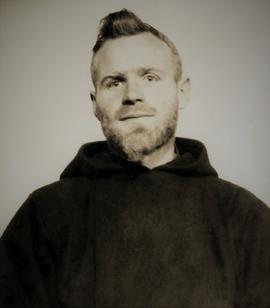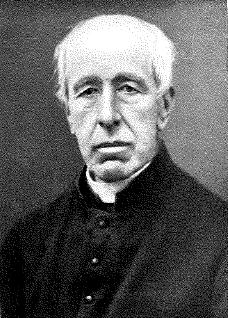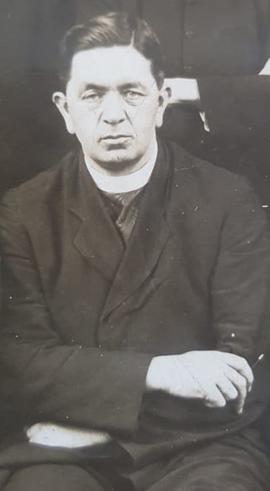- AR 3
- Personne
- 11-10-1830 - 06-10-1899
Scarcely ever in the History of the Anglo-Hibernian Province has an event had to be chronicled which called forth such sentiments of universal regret as the death of Father Alphonsus O'Neill. Though some days have passed since he was laid to rest, it yet seems hardly possible to realize that he is no longer with us. So conspicuous and so prominent was his personality in the Province for over forty years, so intimately was he identified with every good work and undertaking of the Congregation during those years, and so successful in carrying them to a happy issue, that to be all at once bereft of his wise counsel, his eloquent voice, and his strong influence, amounts to little less than a calamity. We can console ourselves however with the reflection that our loss is his gain.
Fr. Alphonsus was born in Stewartstown, Co. Tyrone, on the 11th of October 1830. His early life was spent in commercial pursuits, but never to the exclusion of works of charity and benevolence, in the fulfilment of which he recognised the Christian precept: "Do good, one to another". In those early days he associated himself with the S. Vincent de Paul Society in Belfast, and though years have elapsed since then there are still living some who can testify to the fidelity and devotedness with which he served God in the person of his poor.
It cannot therefore be a matter of surprise that such a start in life would eventually lead to the cloister, and consequently, his fellow-workers in the cause of charity, though they expressed their regret, yet could not withhold their approbation, when in the June of 1852, he made known to them that he had decided on becoming a Passionist. In that year he went to our Novitiate in Broadway, and after his profession, which he made on 13th July 1853, he was sent to Rome to begin his studies for the priesthood. He remained in Rome over four years, and had the happiness of being raised to the priesthood towards the end of 1856 by a Passionist Bishop, Mgr. Joseph Malajoni, who had been for a number of years Bishop in Bulgaria, but who at this time was living retired in our Retreat of Monte Argentaro.
Shortly after his return to these countries, Fr. Alphonsus was appointed Vice Master of novices, but the evidences he gave of successful missionary work, left him very little time to fulfil his duties as Vice Master. From this time till the close of his earthly career, it might be said that the history of his life was identical with the history of the Province. He threw himself heart and soul into every good work which had for its object the wellbeing of the Congregation, and in doing so he knew no fatigue, no personal inconvenience: enough for him that souls were longing for the bread of life, or that their surroundings were such as to place in jeopardy their eternal welfare. It may be truly said that his missionary career was a most successful one. His style was marked with great earnestness and sincerity. He frequently took the part of principal preacher on Missions, but the part in which he was most at home was the Meditations on the Passion of our Lord. The moving and winning words in which he told the sufferings of his Divine Master never failed to draw souls to a greater love of the Crucified, and to a more lively compassion with Him in his sorrows. The Passion was his favourite subject - indeed it might be said to be the theme of his life's preaching.
Though he was frequently employed in preaching charity sermons, whilst he never failed to address himself directly to the cause which he was called upon to advocate, invariably did he embody in his discourse some reference which showed the character of the Passionist.
During his life he filled with care and diligence every office of trust in the Province. He was successively Rector of St. Joseph's, Highgate, S. Paul's, Dublin and S. Ann's, Sutton, and in the Chapter of 1878, he was chosen Provincial, the duties of which he discharged till ‘81. Subsequently when the higher Superiors accepted a new foundation in the far distant Australia, he was appointed Superior of the little band of missionaries who volunteered to preach the Passion under the Southern Cross. For six years he laboured with his usual zeal and energy in those colonies, giving Missions and Retreats and otherwise attending to the various duties with which he was entrusted. After his return to Ireland, he took up his residence in Mt. Argus, where notwithstanding the inroad that years of unbroken labour had made on his constitution, he shared with his younger brethren the several duties peculiar to the Retreat. Indeed it was little more than a week before his lamented death when he occupied the pulpit in St. Paul's, and though it could easily be seen that he was in failing health, there was also evidence that much of the old fire of by-gone days still lived within him.
Apart from his work for the Congregation, of which he was a faithful member, his time and talents were always at the disposal of anyone outside the order who required his service. This was particularly remarkable in the interest which he took in the Sisters of the Most Holy Cross and Passion. They began life as Sisters of the Holy Family, whose object was to afford instruction and shelter to homeless girls in the large manufacturing towns in England. Later on they took the name of Sisters of the Cross and Passion. Fr. Alphonsus arranged their Rule, got first a pro tem. approval from Rome, and eventually got the Holy See to sanction them in perpetuum.
His last illness was little more than a few hours. A few days before the end came he accompanied an invalid to the North and seemed even then to be in his ordinary good health. After his return to Dublin, on Wednesday the 4th, he complained of weakness and overwork, and on the morning of the 5th, he was attacked with violent haemorrhage. The doctor was called in immediately and at once pronounced his case serious. There were frequent returns of the haemorrhage during the day, and after receiving all the last rites of the church, being perfectly conscious to the end, he calmly slept away at two o'clock on the morning of the sixth of October.
The funeral obsequies took place on Monday the 9th in the presence of a large gathering of clergy and laity, after which the remains were consigned to their last resting place in the little cemetery attached to the Retreat.
It seemed providential that notwithstanding his sojourn in many lands, his mortal remains should repose in the Mount Argus he loved so well and served so long. Green as the grassy sward which each succeeding Spring will renew on his quiet grave be the remembrance of his many virtues and his bright example in the hearts of those who knew and loved him. R.I.P.
Fr. ALPHONSUS of the Blessed Virgin Mary (O'Neill) 6th October, 1899.
The ‘Irish News' (Belfast) on the 20th May 1960 carried an article: "TWO DISTINGUISHED PASSIONISTS OF YESTER-YEAR", the story of two brothers from Co. Tyrone who became Passionists: Frs. DOMINIC and ALPHONSUS O'Neill.
They were the sons of a mixed marriage. When their son Edward was born, the mother met the priest with a torrent of abuse and threats of violence, so the child was baptised secretly. That was Fr. Dominic. (Ironically, he was to be clothed a Passionist on July 12th 1852, 22 years later). The Dad compromised, and it was agreed sons would be baptised Catholics, the daughters Protestants. There was only one daughter Mary Ann. She refused to go to church with her mother, and went off to Mass with her brothers. Later, she was to become a Sister of Mercy, in Birmingham, as Sister Alphonsus of the Passion.
The early years were stirring ones. Daniel O'Connell won a lawsuit preventing his fellow Catholics from being evicted from a quarry, where the church in which the young O'Neills were altar boys was situated in Stewartstown.
It was also the period when the Oxford Movement was having its effects on the Hon. George Spencer and the Hon. Charles Pakenham among many others. The future Fr. Alphonsus was to meet up with both in Broadway. A fellow novice was Cfr. (later Brother) LAWRENCE Carr, who later would be the 1st Passionist Brother in Australia, while Alphonsus was Superior of the founding and pioneer party of CPs.
When he said he wanted to be a priest, his mother told a friend that it was the greatest cross of her life: his first Mass was offered for, and brought about, the conversion of his mother.
One page cannot cover his work as a Passionist. He was known as ‘the Silver-tongued Orator' (another Chrysologus!). He did his studies in John and Paul's, was ordained at Monte Argentaro by a Passionist Bishop, Mgr. Mulajoni.
Fr. Alphonsus was later to be a Vice-Master of novices, a Rector, a Consultor, a Provincial, ... and a great Missioner. He was the Founder of the present Australian Province, in that he led the first band of priests and a brother from St. Joseph's Province there; he returned later to the home Province. So (to quote the I.N. article) ‘afar from the townland of St. Patrick's Bell this great Passionist of yesteryear sleeps his last sleep in the peaceful cemetery beside Mount Argus'.
Sources: Fr. Salvian Nardocci's ‘Register'
Fr. Salvian Nardocci's ‘Annals' Vol. 1, pp. 161, 287,361.
‘Irish News' (Belfast) 1960.05.20 (In our archives).










